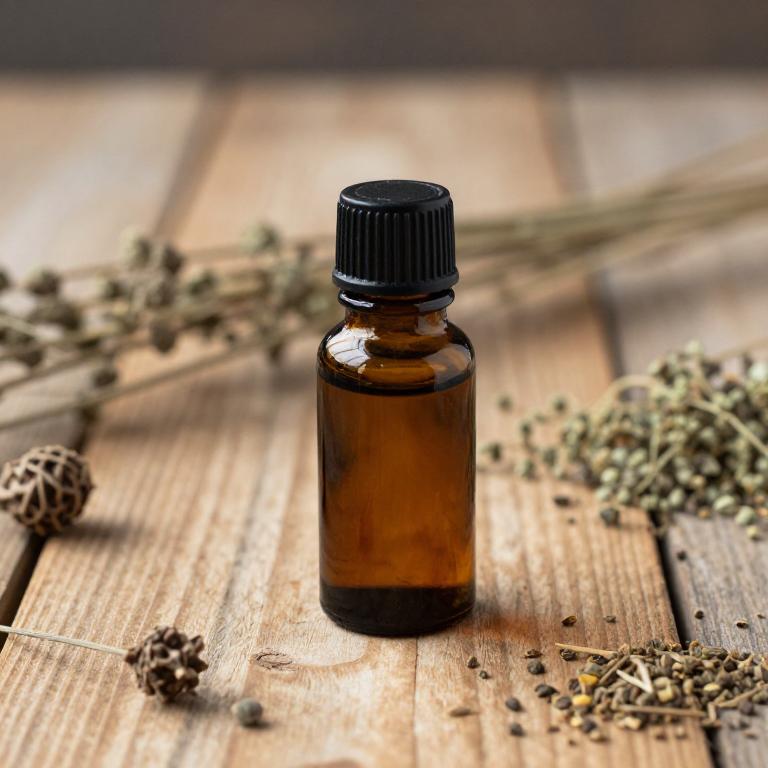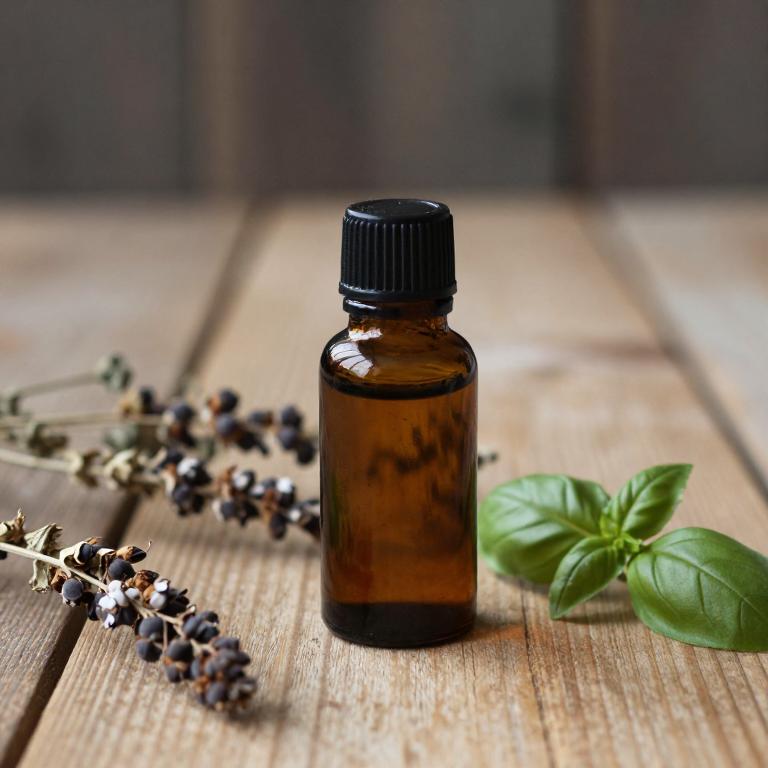10 Best Herbal Essential Oils For Flatulence

Herbal essential oils have been traditionally used to alleviate symptoms of flatulence by promoting digestion and reducing gas buildup in the gastrointestinal tract.
Oils such as peppermint, ginger, and fennel are commonly recommended for their carminative properties, which help ease bloating and discomfort. When diluted properly, these essential oils can be applied topically or inhaled to provide relief from digestive issues. However, it is important to use them cautiously, as some oils may cause irritation or interact with medications.
Always consult a healthcare professional before incorporating essential oils into a treatment regimen for flatulence.
Table of Contents
- 1. Fennel (Foeniculum vulgare)
- 2. Peppermint (Mentha piperita)
- 3. Turmeric (Curcuma longa)
- 4. Cumin (Cuminum cyminum)
- 5. Ginger (Zingiber officinale)
- 6. Ceylon cinnamon (Cinnamomum verum)
- 7. Black pepper (Piper nigrum)
- 8. English lavender (Lavandula angustifolia)
- 9. Basil (Ocimum basilicum)
- 10. Thyme (Thymus vulgaris)
1. Fennel (Foeniculum vulgare)

Foeniculum vulgare, commonly known as fennel, is a herb widely used in aromatherapy for its calming and digestive properties.
Its essential oil is particularly valued for its ability to alleviate symptoms of flatulence by promoting healthy digestion and reducing gas buildup in the gastrointestinal tract. The oil contains compounds like anethol, which have antispasmodic and carminative effects, helping to ease bloating and discomfort. When used in diffusers or applied topically (diluted with a carrier oil), fennel essential oil can support digestive wellness and ease the discomfort associated with excessive gas.
It is often recommended as a natural remedy for those seeking alternative ways to manage digestive issues.
2. Peppermint (Mentha piperita)

Mentha piperita, commonly known as peppermint, is a widely used herb in aromatherapy and herbal medicine for its calming and digestive benefits.
The essential oil derived from peppermint leaves contains active compounds like menthol and limonene, which can help alleviate symptoms of flatulence by relaxing the gastrointestinal muscles and reducing gas buildup. Peppermint essential oil is often used in diffusers or applied topically to the abdomen to ease bloating and discomfort. Its cooling effect can also soothe the digestive tract and promote a sense of well-being.
However, it is important to use peppermint essential oil in moderation and consult a healthcare professional before use, especially for individuals with certain medical conditions.
3. Turmeric (Curcuma longa)

Curcuma longa, commonly known as turmeric, is a plant whose essential oils have been traditionally used for their anti-inflammatory and digestive benefits.
The essential oils derived from Curcuma longa contain bioactive compounds such as curcuminoids, which may help alleviate digestive discomfort, including flatulence. These oils can support gut health by reducing gas production and improving intestinal motility. However, it is important to use them in moderation and consult a healthcare professional before incorporating them into a treatment regimen.
While some studies suggest potential benefits, more research is needed to fully understand their efficacy and safety for managing flatulence.
4. Cumin (Cuminum cyminum)

Cuminum cyminum, commonly known as cumin, is a herb widely used in aromatherapy for its digestive benefits, including the relief of flatulence.
The essential oil derived from cumin seeds contains compounds like limonene and cumin aldehyde, which can help reduce gas buildup and ease bloating. When used in diffusers or applied topically (diluted with a carrier oil), cumin essential oil may stimulate digestion and promote the release of trapped gases in the gastrointestinal tract. It is often recommended for individuals experiencing mild digestive discomfort or as part of a holistic approach to managing bloating.
However, it is important to use cumin essential oil with caution, as it may cause skin irritation or interact with certain medications if not properly diluted.
5. Ginger (Zingiber officinale)

Zingiber officinale, commonly known as ginger, is widely used in herbal medicine for its essential oils, which possess properties that can aid in reducing flatulence.
The essential oil of ginger contains compounds like zingiberene and beta-caryophyllene, which have been shown to have carminative effects, helping to relieve gas and bloating. These oils can be used in aromatherapy or diluted in carrier oils for topical application, offering a natural alternative to over-the-counter remedies. Ginger essential oil is also known to stimulate digestion and reduce the formation of gas in the digestive tract.
However, it is important to use it in moderation and consult with a healthcare professional, especially for individuals with sensitive skin or digestive conditions.
6. Ceylon cinnamon (Cinnamomum verum)

Cinnamomum verum, commonly known as true cinnamon, contains essential oils that have been traditionally used for their digestive benefits.
The essential oil derived from the bark of this plant is rich in cinnamaldehyde, a compound known for its antimicrobial and anti-inflammatory properties. These properties may help alleviate digestive discomfort, including symptoms like flatulence, by promoting healthy gut flora and reducing gas buildup. However, while some anecdotal evidence suggests its potential in easing bloating, scientific research on its specific effects on flatulence is limited.
It is advisable to use cinnamon essential oil in moderation and consult a healthcare professional before incorporating it into a regimen for digestive issues.
7. Black pepper (Piper nigrum)

Piper nigrum, commonly known as black pepper, contains essential oils that have been traditionally used for their digestive benefits.
The essential oils derived from black pepper, including compounds like beta-caryophyllene and limonene, may help alleviate flatulence by promoting gastrointestinal motility and reducing gas buildup. These oils can be used in aromatherapy or diluted in carrier oils for topical application, though internal use should be approached with caution. While some studies suggest potential anti-inflammatory and carminative properties, more research is needed to confirm their efficacy for flatulence specifically.
As with any herbal remedy, it is advisable to consult a healthcare professional before use, especially for individuals with existing health conditions or those taking medications.
8. English lavender (Lavandula angustifolia)

Lavandula angustifolia, commonly known as English lavender, is widely recognized for its calming properties and is often used in aromatherapy.
Its essential oil, derived through steam distillation of the flowering tops, contains compounds such as linalool and linalyl acetate, which are known for their soothing and antispasmodic effects. These properties may help alleviate digestive discomfort, including symptoms like flatulence, by reducing intestinal gas and easing muscle spasms in the gastrointestinal tract. While lavender essential oil is not a primary treatment for flatulence, it can be a complementary remedy when used in conjunction with dietary adjustments and other herbal remedies.
It is important to dilute the essential oil properly before use, as undiluted application can irritate the skin or mucous membranes.
9. Basil (Ocimum basilicum)

Ocimum basilicum, commonly known as sweet basil, is a popular herb whose essential oil is widely used in aromatherapy and natural remedies.
The essential oil of basil contains compounds such as linalool and eugenol, which are known for their digestive benefits. It is often used to help alleviate symptoms of flatulence due to its ability to stimulate digestion and reduce gas buildup in the gastrointestinal tract. When diffused or applied topically, basil essential oil can promote a sense of calm while supporting digestive wellness.
However, it should be used with caution and diluted properly, as it may cause skin irritation in some individuals.
10. Thyme (Thymus vulgaris)

Thymus vulgaris, commonly known as thyme, is a popular herb used in aromatherapy and essential oil blends for its potent antispasmodic and digestive properties.
The essential oil of thymus vulgaris contains compounds like thymol and carvacrol, which are known to support healthy digestion and may help alleviate symptoms of flatulence by reducing gas buildup in the gastrointestinal tract. When used in diffusion or through topical application, thyme essential oil can promote a sense of calm and ease digestive discomfort. It is often combined with other essential oils such as lemon or peppermint to enhance its effectiveness for digestive wellness.
However, it is important to use thyme essential oil in proper dilution and consult with a healthcare professional before use, especially for individuals with sensitive skin or existing medical conditions.